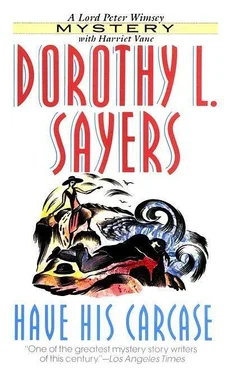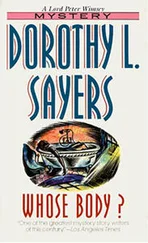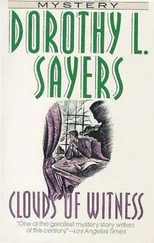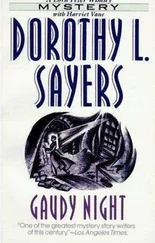The man, a weedy, sandy-haired person with a bulging brow and thick spectacles, gazed at her with courteous incompetence.
‘I’m afraid I can’t tell you. You see, I’m a stranger here myself.’
Well, could you — began Harriet, and paused. After all, what could he do? He was in exactly; the same boat as herself. With a foolish relic of Victorianism she had somehow imagined that a man would display superior energy and resourcefulness, but, after all, he was only a human being — with the usual outfit of legs and brains.
‘You see,’ she explained, ‘there’s a dead man on the beach over there.’ She pointed vaguely behind her.
‘No, really?’ exclaimed the young man. ‘I say, that’s a bit thick, isn’t it? Er — friend of yours?’
‘Certainly not,’ retorted Harriet. ‘I don’t know him from Adam. But the police ought to know about it.’
‘The police? Oh, yes, of course, the police. Well, you’ll find them in Wilvercombe, you know. There’s a police-station there.’
‘I know,’ said Harriet, ‘but the body’s right down near low-water mark, and if I can’t get somebody along pretty quick the tide may wash him away. In fact, it’s probably done so already. Good lord! It’s — almost four o’clock.’
‘The tide? Oh, yes. Yes, I. suppose it would. If — he brightened up with a new thought—‘if it’s coming in. But it might be going out, you know, mightn’t it?’
‘It might, but it isn’t,’ said Harriet, grimly. ‘It’s been coming in since two o’clock. Haven’t you noticed?’
‘Well, no, I can’t say I have. I’m shortsighted. And I don’t know much about it. I live in London, you see. I’m afraid I can’t quite see what I can do about it. ‘There don’t seem to be any police about here, do there?’
He gazed round about, as though he expected to sight a constable on point-duty in the middle-distance.
‘Have you passed any cottages lately?’ asked Harriet.
‘Cottages? Oh, yes — yes, I believe I did see some cottages a little way back. Oh, yes, I’m sure I did. You’ll find somebody there.’
‘I’ll try there, then. And if you meet anybody would you mind telling them about it. A man on the beach with his throat cut.’
‘His throat?’
‘Yes. Near some rocks they call the Grinders.’ ‘Who cut his throat?’
‘How should I know? I should think he probably did it himself.’
‘Yes — oh, naturally. Yes. Otherwise it would be murder, wouldn’t it?’
‘Well, it may he murder, of course.’ The hiker clutched his staff nervously. ‘Oh! I shouldn’t think so, should you?’
‘You never know,’ said Harriet, exasperated. ‘If I were you, I’d be getting along quickly. The murderer may be somewhere about, you know.’
‘Good heavens!’ said the young man from London. ‘But that would-be awfully dangerous.’
‘Wouldn’t it? Well, I’ll be pushing on. Don’t forget, will you? A man with his throat cut near the Grinders.’
‘The Grinders. Oh, yes. I’ll remember. But, I say?’
‘Yes?’
‘Don’t you think I’d better come along with you? To protect you, you know, and that sort of thing?’
Harriet laughed. She felt convinced that the young man was not keen on passing the Grinders.
‘As you like,’ she said indifferently, walking on.
‘I could show you the cottages,’ suggested the young man. ‘Very well,’ said Harriet. ‘Come along. We’ll have to be as quick as we can.’
A quarter of an hour’s walk brought them to the cottages two low thatched buildings standing on the right-hand side of the road. In front of them a high hedge had been planted, screening them from the sea-gales and, incidentally, helping to cut off all view of the shore. Opposite them, on the other side of the road, a narrow walled lane twisted down to the sea’s edge. From Harriet’s point of view, the cottages were a disappointment. They were inhabited by an aged, crone, two youngish women and some small children, but the men were all out fishing. They were late back; today but were expected on the evening tide. Harriet’s story was listened to with flattering interest and enthusiasm, and the wives promised to tell their husbands about it when they came in. They also offered refreshment which, this time, Harriet accepted. She felt pretty sure; that the body would by now be covered by the tide and that half an hour could make no real difference. Excitement had made her weary. She drank the tea and was thankful.
The companions then resumed their walk, the gentleman from London, whose name was Perkins, complaining of a blistered heel. Harriet ignored him. Surely something would soon come along.
The only, thing that came was a fast saloon car, which overtook them about half a mile further on. The proud chauffeur, seeing two dusty trampers signalling, as it appeared to him, for a lift, put his stern foot down on the accelerator and drove on.
‘The beastly road-hog!’ said Mr Perkins, pausing to caress his blistered heel.
‘Saloons with chauffeurs are never any good,’ said Harriet. ‘What we want is a lorry, or a seven-year-old Ford. Oh, look! What’s that?
‘That’ was a pair of gates across the road and a little cottage standing beside it.
‘A level-crossing, by all that’s lucky! Harriet’s sinking courage revived. ‘There must be somebody here.’
There was. There were, in fact, two people — a cripple and a small girl. Harriet eagerly asked where she could get hold of a car or a telephone.
‘You’ll find that all right in the village, miss,’ said the cripple. ‘Leastways, it ain’t what you’d call a village, exactly, but Mr Hearn that keeps the grocery, he’s got a telephone. This here’s Darley Halt, and Darley is about ten minutes walk. You’ll find somebody there all right, miss, for certain. Excuse me a minute, miss. Liz! the gates!’
The child ran out to open the gates to let through a small boy leading an immense-cart-horse.
‘Is there a train coming through? asked Harriet, idly, as the gates were pushed across the road again.
‘Not for half an hour, miss. We keeps the gates shut most times. There ain’t a deal of traffic along, this road, and they, keeps the cattle from straying on to the line. There’s a good many trains in the day. It’s the main line from Wilvercombe to Heathbury. Of course, the expresses don’t stop here, only the locals, and they only stops twice a day, except market days.’
‘No, I see.’ Harriet wondered why she was asking about the trains, and then suddenly realised that, with her professional interest in time-tables, she was instinctively checking up the ways and means of approaching the Grinders. Train, car, boat — how had the dead man got there?
‘What time—?’
No, it didn’t matter. The police could check that up. She thanked the gate-keeper, pushed her way through, the side-wickets and strode on, with Mr Perkins limping after her.
The road still ran beside the coast, but the cliffs were gradually sloped, down almost to sea-level. They saw a clump of trees and a hedge and a little lane, curving away past the ruins of an abandoned cottage to a wide space of green on which stood a tent, close by the sandy beach, with smoke going up from a campers’ fire beside it. As they passed the head of this lane a man emerged from it, carrying a petrol-tin. He wore a pair of old flannel slacks, and a khaki shirt with sleeves rolled up to the elbow. His soft hat was pulled down rather low over his eyes, which were further protected by a, pair of dark spectacles.
Harriet stopped him and asked if they were anywhere near the village.
‘A few minutes farther on,’ he replied, briefly, but civilly enough ‘I want to telephone,’ went on Harriet. ‘I’m told I can do so at the grocer’s. Is that right?’
Читать дальше












